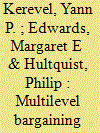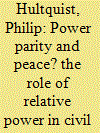| Srl | Item |
| 1 |
ID:
153820


|
|
|
|
|
| Summary/Abstract |
This article introduces a regional trade agreement (RTA) simulation for undergraduate students. The simulation uses a multilevel bargaining framework, in which students can represent not only governments of negotiating countries but also domestic interests. By allowing students to experience international bargaining at different levels, they gain a deeper understanding of controversial international trade processes.
|
|
|
|
|
|
|
|
|
|
|
|
|
|
|
|
| 2 |
ID:
124112


|
|
|
|
|
| Publication |
2013.
|
| Summary/Abstract |
Theories of civil war highlight how relative power affects conflict onset, dynamics, strategy, outcome, and duration. Yet most studies of civil war have not been able to capture rebel power adequately and often rely on national-level characteristics to infer relative power distributions. This study addresses this shortcoming by using a troop strength measure to test arguments about how relative power affects the likelihood of civil conflict settlement. Drawing on the international crisis bargaining literature, while noting the inherent differences between interstate and intrastate conflicts, this study argues that the condition of power parity increases the likelihood of negotiated settlement and ceasefire. Weak rebels are unable to achieve concessions through negotiation since governments view them as minor threats. Yet governments have difficulty defeating weak rebels due to an emphasis on guerrilla warfare. On the other end of the spectrum, rebels that are superior to the government in strength are unlikely to settle given their power advantage. Strong rebels that can rival the strength of the government (i.e. they are near parity) can exact more concessions because fighting at parity exposes information about how long each side can hold out while escalating the costs of war, giving each side a greater incentive to negotiate and eventually seek a ceasefire or peace agreement. This argument is supported using data on 112 dyads in the post-Cold War period.
|
|
|
|
|
|
|
|
|
|
|
|
|
|
|
|